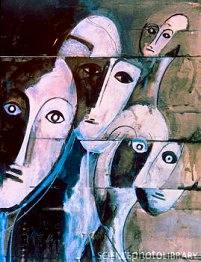I understand ‘mad knowledge’ as experiential, embodied, tacit knowledge stemming from the direct, subjective, lived experience of acute mental distress. I see both individual and collective dimensions of mad knowledge. Individual dimensions of mad knowledge – in my mind-point to individual suffering and distress, whereas collective dimensions pertain to the body of experiential knowledge accumulated through the history of the psychiatric survivor movement.

I have long been grappling with the question as to how we can talk about and represent madness and mad knowledge, given that the experience of madness/acute mental distress is arguably something unspeakable, un-representable, something that cannot be totally understood and readily articulated. What comes to mind here is Sarah Kofman’s description of the Holocaust as something ‘before which all possibility of speech ceases’.
How can we talk about and represent madness and mad knowledge without madness being ‘lost’ in rationally discursive translation?
I have been thinking that we essentially need different forms of representation that would help overcome the limits of rational language/discourse when it comes to extreme states and experiences, such as those of madness. Such forms include visual art , poetic language, first person narratives of madness/mental health testimonies.
When I came across certain examples of psychiatric survivor poetry, I felt that in those poems madness is talked about and represented in a way that does full justice to the experience of extreme states and the experiential, embodied, tacit knowledge stemming from them. I felt that in those poems madness is not ‘lost’ in translation…
One of those poems is Peter Campbell’s Drugtime Cowboy Joe , included in the collection Brown Linoleum, Green Lawns that was published in 2006.
Drugtime Cowboy Joe
Nutters get
Compulsory sunsets.
Wall to wall landscaping of the soul.
Always a rugged coast, salt-flecked but liveable.
Always a hero looking west,
Going on about the forward march of science.
You can have your sunsets cloudy bright,
Bright, bright to cloudy or extra bright
With cloudy intervals at intervals
And something special for that tickle
Of psychosis.
You can have them anyway you need.
But always numbing,
Perpetually numbing
And always, everlastingly,
Cold.
Nutters get
To stand at the window, drinking the sunset down,
Tasting no rain.
Feeling the cracks in their spirit
Silt up.
Nutters get compulsory sunsets.
Always start writing back:
Wish we weren’t here.

(http://www.surrealists.co.uk/surrealism_in_advertising.php)
